Setting a Direction for Evergreen Search
Kathy Lussier, Coordinator
Massachusetts Library Network Cooperative
2016 Evergreen International Conference

Why Are We Having This Discussion?
While planning for our FY16 development projects, MassLNC libraries identified search as the highest priority for development.
We view search as one of the most important pieces of the ILS, if not the most important. It's what allows our users to find those resources we spend so much time cataloging so that they can then place holds on them, check them out from the library, or access them in some other way. It is the main entry point to our collections.
It's not the first time we've identified search as a priority
- Sponsored Browse Search
- Sponsored Development to Make It Easier to Define Format Limiters
- Sponsored Activity Metric Project (2.11)
- Many other project requirements were addressed by 2.4 community project to improve the Evergreen query parser.
- Implemented many configuration changes
Sure, We Can Add More Features, But Do We First Need to Look at the Underlying Infrastructure?
We're Not Alone
Enis, Matt. "Wish List | Library Systems Landscape 2016", Library Journal, April 6, 2016.
"When asked what types of features patrons have requested, or what type of features would be of greatest assistance to patrons, search functionality again came up frequently. In addition to general write-in comments about requests for “better search features,” “better ranking” of OPAC search results, and “ease of searching with natural language,” several respondents said that patrons have asked why their library’s OPAC can’t be “more like Amazon.”
Step 1: Identify Our Search Needs
- Focus Group to Brainstorm Ideas for New Features We Want and Existing Features that Are Important to Us.
- Community Survey to help prioritize the ideas.

Assess Our Options
- Doing work within PostgreSQL to improve performance and take advantage of functionality available in new releases.
- Evaluating whether other options can support the type of search we need in Evergreen, and at what cost
What Have We Learned From the Focus Group Discussions?
What Do We Like About the Current Search?
- Strong advanced search filtering (esp. format and copy location limiters)
- Using MARC fixed fields for format filters
- Facets for bibliographic information
- Call number shelf browse
- Highly configurable
- The ability to search a lot of MARC data in a keyword search.
Existing Features that Weren't Mentioned
- Located URIs - the ability to scope and search electronic resources without adding copies
- Groups Formats and Editions searching (but this functionality was discussed extensively for things to improve)
- Searching / displaying real-time availability information
Potential New Features / Areas of Improvement
Popular Suggestions
- Improved Speed
- Improved Relevance Ranking
- Did You Mean?
- Different Types of Facets
- Publication Date
- Formats
- Audience
Better Balance Between Fuzziness and Precision
"as powerful and useful that "stemming" can be; currently the implementation can be useless for certain words like: music, musician, musical"
"One of the things we hear from patrons and staff is "unforgiving"...meaning that if you provide a search string that is not found in a record, barring stemming and possibly some other things, you won't get the results you're looking for."
Or Maybe We Should Tell Users When Fuzziness Had Been Employed
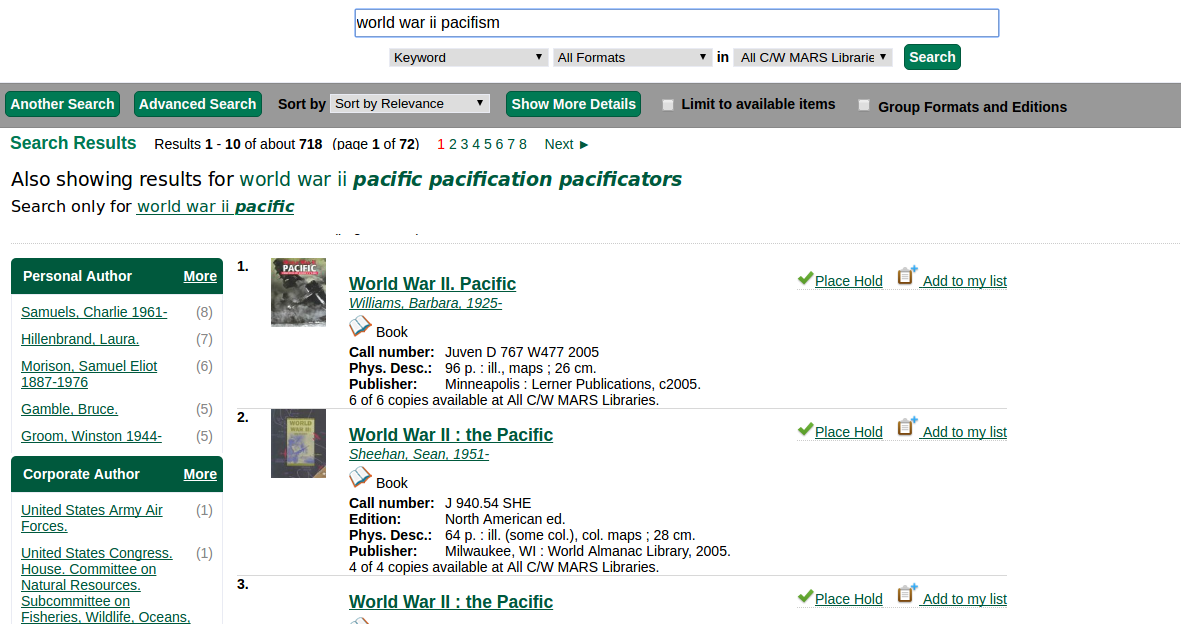
With Improvement, Maybe Group Formats & Editions Could Be Our Primary Search
- Ability to manually tweak metarecord groupings
- Using external data, like OCLC work entities, to group the records.
- Provide edition-specific information on grouped search results page.
- Provide easily-accessible links to jump to another format / edition of a work.
Nashville Public Library Catalog Using Pika Discovery Layer
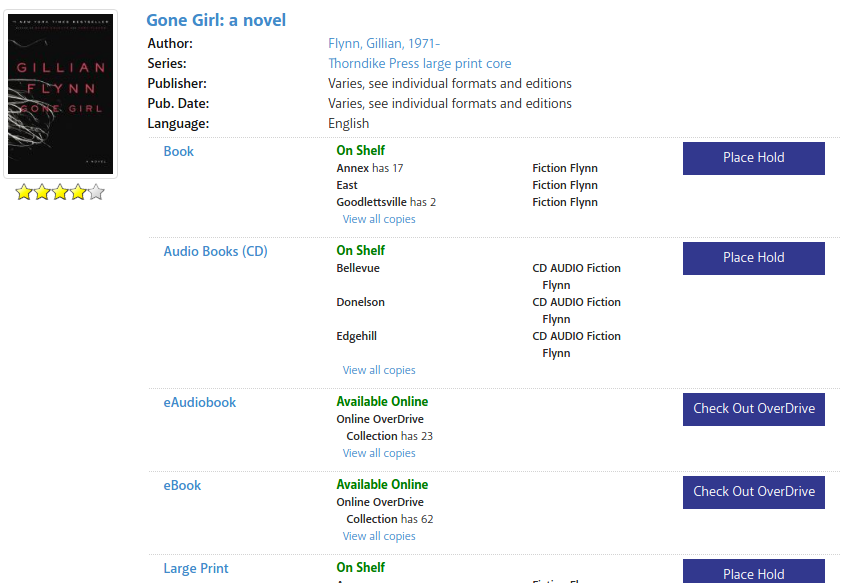
Jump Quickly to Other Formats and Editions
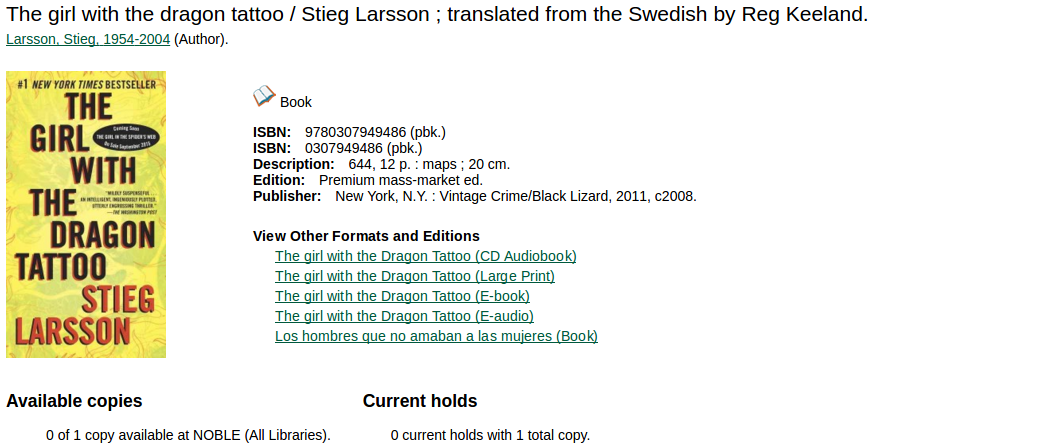
Creative Ways of Using Authority Information or External Data
- Disambiguation information
- Related searches
- Display of external content related to what is being searched
Related Searches
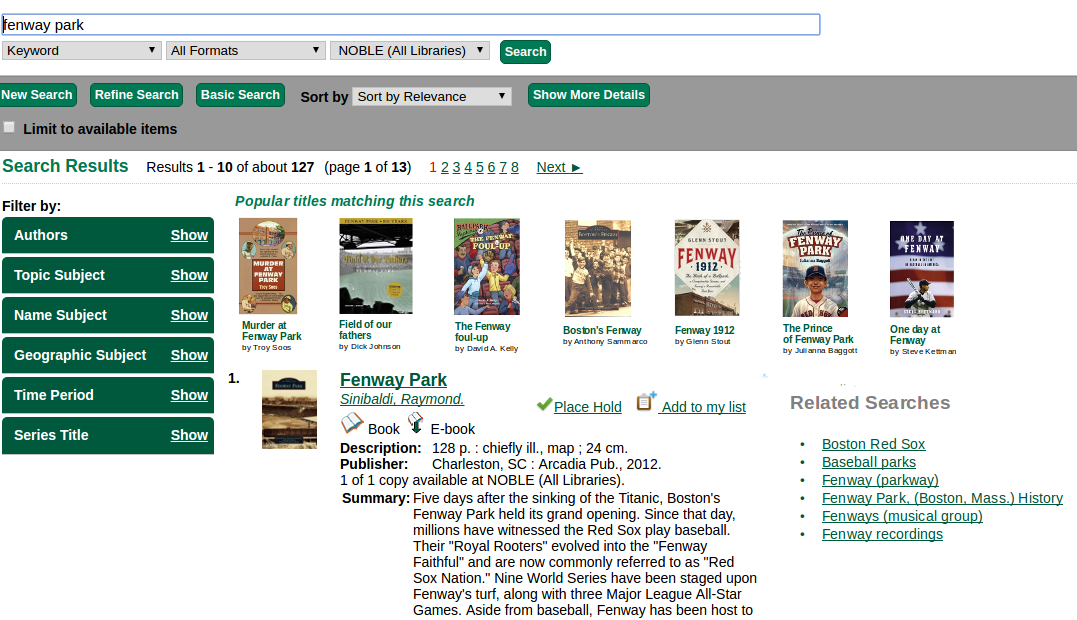
Displaying External Content
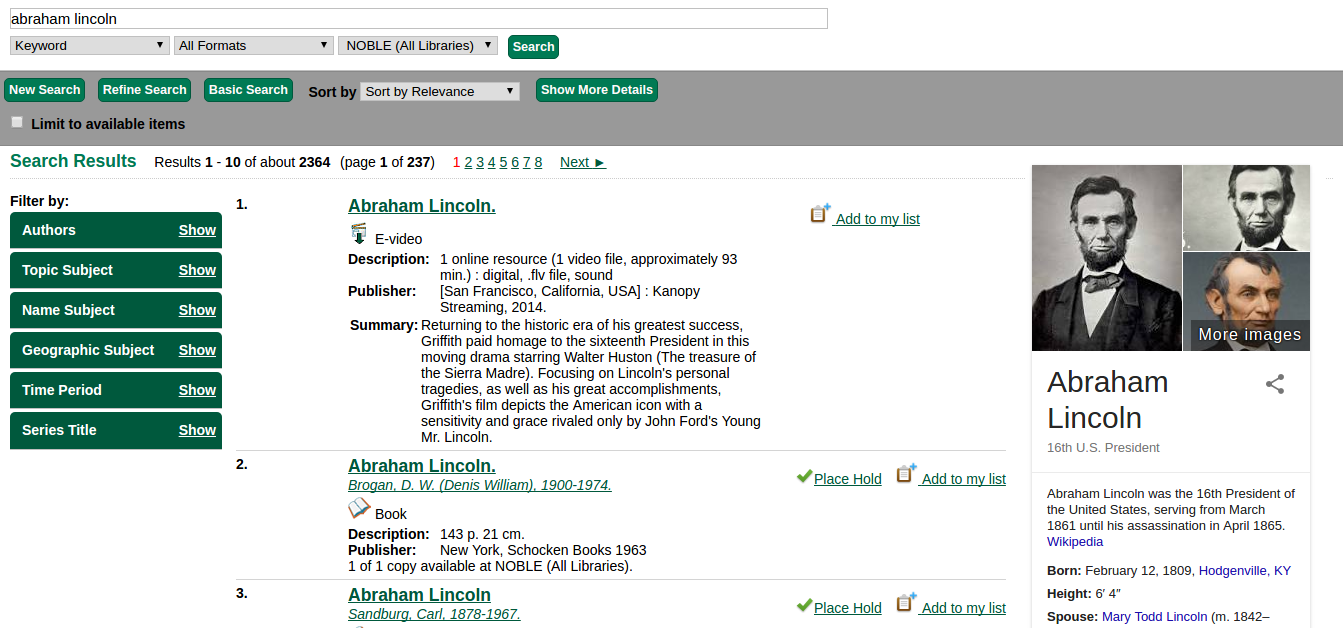
Improvements to Zero Hits Page
- Drops user into a browse search
- If the zero hits page is caused by a time out, let the user know and provide tips for refining search.
- Suggest a meaningful alternative (Did You Mean?)
- Automatically launch the alternative search.
Learning from User Behavior
- Improving search retrieval/relevance through analysis of user behavior, handled in a way that respects user privacy.
- If a specific set of search terms results in users clicking the same record 90% of the time, that record becomes more relevant.
- If a "Did You Mean?" suggestion is almost always clicked, that suggestion becomes more meaningful.
- This data should never be linked to specific users.
Easier to Understand
- We like the knobs, but we don't always know where to go to turn them or what they will do. Make it easier to configure.
- Show us why specific results are retrieved (highlighted search terms) or why they rank the way they do (relevance scores?).
- "If I can tell why the system is doing something, I can try to adjust the behavior to suit. Otherwise, I am just shooting in the dark sometimes."
Suggestions for Features We Already Have
- We did get some suggestions for features already available.
- These suggestions point to a need for more documentation or, perhaps, better defaults set in the main Evergreen download.
Next Steps
- Survey will be posted shortly after the conference to prioritize ideas and weed out ones where there isn't broad consensus.
- We'll then begin looking at options for what might best meet those needs identified in the survey.
Questions?
Contact
Kathy Lussier, Coordinator
Massachusetts Library Network Cooperative
klussier@masslnc.org
IRC: kmlussier
Setting a Direction for Evergreen Search
By Kathy Lussier
Setting a Direction for Evergreen Search
- 1,586



